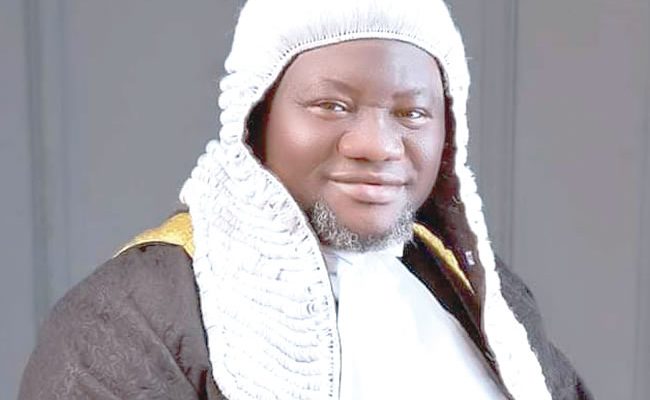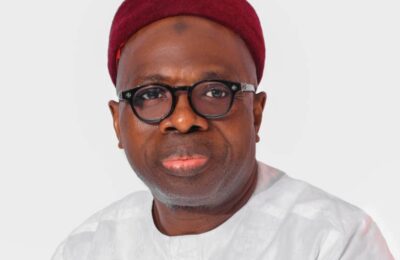Labaran Magaji is the Attorney General (AG) and Commissioner of Justice of Nasarawa State. Until his appointment he was a federal prosecutor and member of Nigeria’s Complex Casework Group (CCG) in the chambers of the Attorney General of the Federation (AGF), Federal Ministry of Justice, Abuja. He hosted select journalists where he spoke on the Supreme Court judgment on local government financial autonomy and other legal issues, SUNDAY EJIKE was there.
Reaction to Supreme Court judgment granting financial autonomy to LGAs in the country
The Supreme Court judgment granting financial autonomy to local government areas in the country was a very good one. For us in Nasarawa state, we don’t tamper with funds meant for area council administration.

Our submission in the matter was in line with that of the federal government, that was why we were worried that the state was joined as a party in the suit filed by the Federal Government against the states of the Federation.
Local government areas in Nasarawa state have full autonomy in the state. We have democratically elected council officials and the State government does not interfere with the financial allocations from the Federation Account to the local government areas.
Our worry now is the N70,000 minimum wage approved for workers. It would be difficult for some local governments to pay salaries. The state government has been assisting in the management of local government areas’ administration in the state.

Why he accepted to serve as the AG of Nasarawa State
My appointment by the Nasarawa State governor did not just come like that. It is one of the few appointments that were not lobbied for. The governor told me that my appointment was purely based on merits. And despite the fact that he maintained that position, I have never taken it for granted and claimed to be the best. I have not also taken it for granted that the fact that I did not lobby for this appointment is a right that I must be here.
I took the appointment as a very big challenge to me, because I have little or no knowledge of what he (the governor) saw in me that made him take that decision of appointing me as the Attorney General of Nasarawa State.
Experience so far
It may interest you to know that I am just one year old in office. But, one thing that I can always thank His Excellency (the governor) for is, guided by my experience as a public servant in the Federal Ministry of Justice, I know that the office of the Attorney General is one office that a Chief Executive will want to use to sustain his office, but for once, His Excellency, Engr Abdullahi A. Sule has never influenced any opinion coming from this office that shapes his government.
Again, for once, he has never turned down any opinion coming from this office. And, there has never been any activity of government that His Excellency, Engr Abdullahi Sule will ever engage in without consulting this office.
When I came on board, the governor told me that he wanted a legal reform that is going to be built on three tripods – access to justice, human right and the rule of law. And my immediate response to him was that in every society where the Chief Executive focuses on and gives attention to these three tripods of rule of law, protection of human rights and access to justice, nothing is left.
And, this has consistently been demonstrated by His Excellency, the governor, and I find him a leader that, if I am to choose a leader time without number, I think I will repeat choosing him as my leader continuously. I am saying this, because I am not reckless with my words. You can attest to the fact that I am a fearless person. I can never be a sycophant. But, when you see a spade endeavour to call it a spade and you will have peace.
On his impact so far
Let me give an example. When I assumed office, none of the bank accounts of the Nasarawa State Government was functioning. No single account was functioning. In fact, salaries of civil servants were paid via POS (point of sale) because all the accounts were garnisheed. And, what happened was that they were advising him (the governor) to go to court or go on appeal in respect of judgments that were already given against the state government.
But, I came out with a robust idea. I said look, if you are owing you are owing, there are no two ways about it. I said let us negotiate with people we are owing. What we can do, let us do it. No court will say no, you are not owing as long as there is every document showing that you are owing. I said why don’t we relieve ourselves of this burden?
So, since then, gradually, we have been at it. Those we can defray, we have defrayed; those with whom we could negotiate installment payment, we negotiated. Those we could win in court, we won. We were able to achieve these because of his (the governor’s) humility. This is because he agreed to the opinions my office supplied. And, I am happy to inform you that as at today, no single account of government is held on account of garnishee.
When I came here, this office complex did not, in any way, look better than a glorified local government secretariat. Looking at the structure of the Ministry of Justice today, at least modestly, it looks like a chamber of the honorable Attorney General. The lawyers too are now afforded some level of comfort. At least, our lawyers in the state are now enjoying a certain level of comfort, courtesy of the regard and respect the governor has for the Office of the Attorney General.
In terms of training for lawyers in the ministry, when I came in they confessed to me that they had never traveled beyond Lafia (the state capital) for any training. But, I have access to the International Institute of Justice and Rule of Law, where lawyers from this place could have some kind of exposure.
I took my management team to the National Institute of Policy and Strategic Studies, Kuru in Jos, Plateau state for managerial skills, the Independent Corrupt Practices and other related offences Commission (ICPC) Institute. I have been able to facilitate all manners of training for them. In most cases, I have taken them to Abuja and Lagos.
We, in the Ministry of Justice here, position ourselves as police of all the Ministries, Departments and Agencies (MDAs) of the state government. We keep a check on the activities and the way they spend their finances, too. We do that all in an attempt to actually guide the government.
And of course, this couldn’t have been possible if the governor had not given us the free hand to operate. What does he always say to me? He will say: ‘I brought in so that you can bring your experience to bear.’ So, I am happy to inform you that I am the most accessible member of the cabinet to His Excellency, second to the deputy governor and the secretary to the government.
His experience in keeping with the principle of rule of law in the state
On the issue of respect for rule of law and related democratic principles, this government is doing well. Again, I will give an example. There was an instance when a journalist, who works in this state had rift with the system, which he was not happy with and he resorted to blackmail perhaps, with the intention of attracting attention to himself.
That time was the buildup to the decisions of the tribunals on the various post-election cases. The period when people were all angry because they lost at the polls. You know that Nasarawa State was one of the hotbeds during the last election season, because our election was characterized by two things – religion and tribe. But at the end of the election Engr. Abdullahi A. Sule won and those who were aggrieved went to the election petition tribunal to challenge the electoral outcome.
It was during that time that I came on board, shortly before judgment was delivered by the tribunal. The tribunal upturned the election and we went on appeal and, the Court of Appeal upturned the decision of the tribunal.
Now, those who lost were not happy with everything, so they continued to mount pressure on the government, using all manner of weapons available at their disposal, including the media, to actually blackmail the government. But one thing that I discovered was that the governor remained steadfast. He never asked anybody to go after them. That was one thing very unprecedented to a sitting government.
We had instances where women were recruited to sustain protests for upward of six months in the states, and for once, he never asked anybody to go after them.
It was in the heat of that, that the journalist just went and published online that N40 million was stolen from the governor’s bedroom. The governor was furious. He was furious, not because they said the money was stolen, after all no money was stolen anyway, but he was concerned about the perception of the common man.
So, everybody was bringing his idea of how to go about it. Then, I said no, let us remind ourselves that we agreed to operate based on the principles of rule of law, human rights and access to justice. For that reason, you the governor, an individual like every other person, what you should do is to cause a petition to be written to the appropriate authority, saddled with the responsibility of investigating this issue.
So, we caused a petition to be written to the Commissioner of Police. It took the police months to trace who actually was the author of the publication and the police were left to handle the case without any interference from the government.
Also, during that last protest, the police arrested about 63 people, but none of them spent one hour beyond the time allowed by law. At the directive of the governor, we went to court to obtain a release order, and it was served on the police, and they were all released.
This is the kind of person that I like to work with, because, as a British-trained prosecutor, everything I was taught is in keeping with the principles of rule of law, human rights and, of course, access to justice.
Challenges posed by prison congestion
One of the measures being adopted is the deployment of the instrument of prerogative of mercy. On every event, His Excellency will make it a duty to commemorate that event with discharging or granting pardon to some deserving inmates.
We introduced that when I came in August last year. By October the same year, he discharged 11 inmates. On January 1 this year, he discharged 14 inmates. Last, October 1, he discharged 12 inmates.
And, aside from that, during prison visits of the honorable, the Chief Judge, he (the governor) always asks her (the CJ), “When you go the correctional centre, if you find any inmate that is owing, either fine or compensation, put the money together and bring it to the state government so that we can defray it to allow the inmates have freedom.” Through that method, the CJ has freed so many people.
Position on the call for separation of the office of the Attorney General and that of the Commissioner for Justice
I, for one, since I came in, I have also insisted that if you want me to answer you, call me the Attorney General, but for the Commissioner for Justice, wait until I get to the Executive Council meeting. This is because it is a nomenclature that will compromise the professionalism in the office of the Attorney General. Because, like I said, the office of the Attorney General is supposed to be a police to other MDAs, but the Commissioner of Justice is supposed to be a colleague to other members of the Executive Council. So, if I want to function as a police of the MDAs that I am, I wear the clothes of the Attorney General.
So, if the office is separated, I think it is even going to function well. In fact, the criminal justice system is going to function effectively well. It is happening in other climes, so it shouldn’t be a strange thing to happen here in Nigeria. I have been maintaining that. Probably, because of my orientation as one who has worked for a decade in the Department of Public Prosecution. So, this is my take on that. It is personal though, and not the position of the government of the state.
Challenge of delay in criminal trials
Since I came in, we have addressed that issue frontally. This is, because I personally go to court. And anytime I lead my team to court, my first application to the judge is the application for accelerated hearing. And, by virtue of my position as the Attorney General, I go there fully armed with all my witnesses, all the exhibits and everything.
So, every day I go to court, I finish a case, every day. I think the minimum witnesses I take a day is four. And, when I review a case of more than 10 witnesses and I see that I have only five or four that can produce what I need to prove my case, I do away with others to avoid unnecessary delay.
So, even the inmates themselves are now happy. I went to the correctional centre last October, they (the inmates) were even hailing, because they know that any day they go to court, their case will go on. All lawyers in the ministry go to court. Nobody goes to court and takes adjournment under my watch, not at all. It is either you are ready to go on or you just forget it.
So, all my lawyers, we are not many, every time, we always have conference here. I know every lawyer by name. I know every lawyer by the file he is handling. We also have our case management system, where on the press of a button, I will be able to tell you the number of cases we have in all the area offices, in Karu, in Kefi, in Akwanga, in Lafia. I know them.
I know in which court a matter is going on. So, the issue of delay in criminal trials in Nasarawa State is, in fact, a bygone. In fact, my experience will be useless if I will come here and we continue to experience delay in criminal prosecution.
On whether the Nasarawa State government will adopt the National Minimum Standards, intended to ensure uniformity in the application of the Administration of Criminal Justice Act/Administration of Criminal Justice Laws (ACJA/ACJLs) across the country
That is a document that we are all putting together, which is just passing through the clearing house. There is absolutely nothing in that document that is strange to our thinking, our vision and what we are doing here in Nasarawa State.
We are waiting, ready to receive it. I think I have a proposal to bring in those experts to train my lawyers to key into it immediately and move on. We plan to be like a pacesetter in that area.
One of the provisions contained in the document is the timeline within which legal opinion must be given by the Ministry of Justice, won’t this affect?
Under my watch, you don’t dare go and keep my book. I don’t send you a file and you go and keep it. What are you doing? What are we even paying you salary for? That is not even an issue. We don’t even have any issue with that provision.
In fact, what we have introduced here is that, where there is any case file that requires legal opinion, we don’t even wait till 14 days. No, it is just a phone call away to the investigating officers, or they call me themselves. It is either the DC, CID (Deputy Commissioner, Criminal Investigation Department) calls or the Commissioner of Police himself calls, and we move to court straight.
No, we don’t have any cause to delay any legal opinion. You don’t have to go to your grandparents in the grave to ask them what to do. You are trained to give legal opinions, so you should be able to give it.
Disposition to the provision in the document that plea bargain shall apply to all offences
For the idea of plea bargain on all offenses, I have a reservation. My reservation is actually, not only for capital offenses, but some offenses. I will give you an example. One lady came here, her four-year-old daughter was raped. The matter was investigated. We took the matter to court. Then, she suddenly came here one day and told me that her political godfather asked her to go and withdraw the case.
I told her that it was impracticable and that the most she could do was to withdraw her evidence. I told her that withdrawing the case was not within her powers. Her request beats my imagination.
And I asked her if she was actually the mother of the victim. Somebody raped your four-year-old daughter. If we drop the case against the defendant, because he raped your own daughter, what about if he goes and rapes other people’s daughters who are not made political women leaders. What do you want us to do?
I told her I was going to think about her request. But, the bottom line is that the guy is still in prison, so I’m still thinking about it. These are some of the things.
That is why, sometimes, when we are doing a meeting of the prerogative of mercy, I look at it, what is the offense? If somebody is involved, what will he feel? If we are pardoning him, how will the government compensate the victim? That is what I do.
So, in an ideal situation, we should call him/her (the victim) and say, gentleman/woman, that person that hurt you, don’t be surprised to see him/her on the streets tomorrow. This is the situation, but we are sorry, as a government. What do you want? Okay, take, this is what you can get. But, you can’t just let a criminal go on the basis of a plea bargain, while the victim is there suffering.
We are not saying that it is bad to grant pardon, but the person that is affected by the consequence of the criminality leading to that pardon, should be carried along. This is my own concept of this idea of pardon or plea bargain. All of these can only be achieved if you have the experience of the things we are talking about.
So, that is why, even the conventional plea bargain under Section 270 of the Administration of Criminal Justice Act, if you look at it, is compensating the government, because if you stole money and you want to enter a plea bargain, they will say you should surrender some. Who was a victim? The government. So, that sum that you surrender is going to the government. If it was an individual’s funds that you stole, the individual should also be entitled to some form of compensation. That is fairness. This is the perspective from which I am looking at that plea bargain provision in the National Minimum Standards 2024. No matter where I find myself, this is going to be my argument.
READ ALSO: How opposition parties can defeat Tinubu in 2027 – Primate Ayodele







